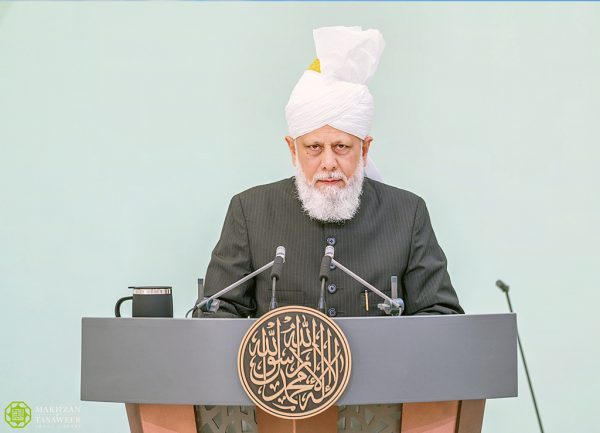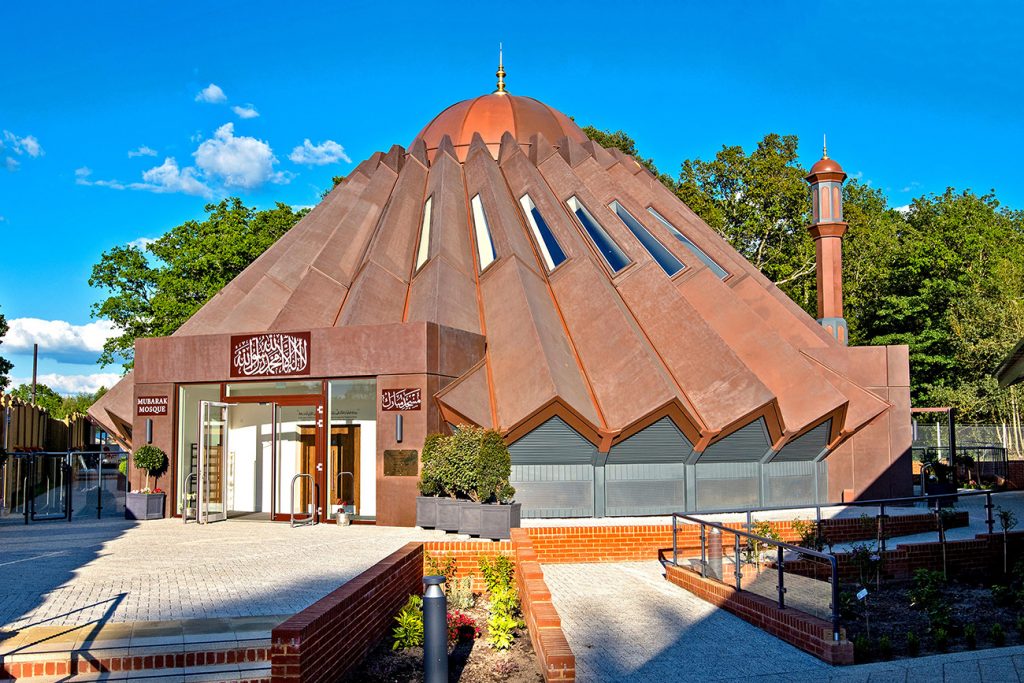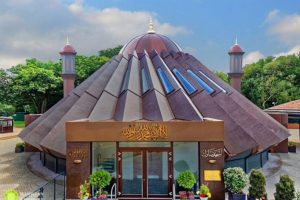After reciting Tashahhud, Ta‘awwuz, and Surah al-Fatihah, His Holiness, Hazrat Mirza Masroor Ahmad (aba) said that in the previous sermon, he mentioned an incident of a man being killed despite conveying the Islamic greeting of peace (Salam). His Holiness (aba) said he also presented a verse from the Holy Qur’an, which outlined that a person who conveys this greeting should not be told that they are not a believer.

His Holiness (aba) said that upon learning of this incident, the Holy Prophet (sa) expressed great displeasure. Some narrations even mention that the Holy Prophet (sa) even prayed against the person who did this. He considered this to be a grave mistake. If only the so-called clerics of today would understand and desist from their cruelties against Ahmadis.
Prophecy of a Manifest Victory
His Holiness (aba) said that he would now begin mention of the Conquest of Makkah, which took place in Ramadan 8 AH. This was the great victory which had been foretold by Allah the Almighty, as a result of which droves of people entered the fold of Islam. It is stated in the Holy Qur’an:
‘And say, “O my Lord make my entry a good entry and then make me come forth with a good forthcoming. And grant me from Thyself a helping power.’ (The Holy Qur’an, 17:81)
His Holiness (aba) said that this verse was revealed before the Holy Prophet’s (sa) migration to Madinah, and it foretold the migration along with the ultimate victory at Makkah. Then, with regards to the Conquest of Makkah, it was foretold in the Holy Qur’an:
‘Surely, Allah was well pleased with the believers when they were swearing allegiance to thee under the Tree, and He knew what was in their hearts, and He sent down tranquillity on them, and He rewarded them with a victory near at hand.’ (The Holy Qur’an, 48:19)
His Holiness (aba) said that the day the Holy Prophet (sa) departed from Makkah, God promised him that very day not to worry, for one day He would grant him victory at Makkah. It is recorded that on the same day as the Holy Prophet (sa) began his migration, the following verse of the Holy Qur’an was revealed:
‘Most surely He Who had made the teaching of Qur’an binding on thee will bring thee back to thy place of return.’ (The Holy Qur’an, 28:86)
His Holiness (aba) said that according to Imam Fakhruddin Razi, ‘place of return’ refers to Makkah. It is recorded that this verse was brought to the Holy Prophet (sa) by the Angel Gabriel (as) as he turned back and expressed his love for Makkah when he was leaving for Madinah. This was yet another proof of the truthfulness of the Holy Prophet (sa), as God granted him this prophecy, which was a matter of the unseen.
The Meaning of Turning One’s Face Towards the Sacred Mosque
His Holiness (aba) said that the Conquest of Makkah was also foretold at another instance in the Holy Qur’an, whilst also serving as a reminder for the Holy Prophet (sa) and the Muslims that they must strive and pray for this to come to pass. In a sense, it can be said that all the battles and conquests that took place during the time of the Holy Prophet (sa) were with the ultimate goal of attaining victory at Makkah. It is stated in the Holy Qur’an:
‘And from wheresoever thou comest forth, turn thy face towards the Sacred Mosque.’ (The Holy Qur’an, 2:150)
His Holiness (aba) explained by quoting Hazrat Mirza Bashiruddin Mahmud Ahmad (ra) that this verse does not refer to the offering of prayers and at that time turning one’s direction towards the Holy Ka’bah, because ‘from wherever thou comest forth’ does not have any inherent association with offering prayers. Therefore, this means that the verse must be referring to something other than offering prayers. This verse actually refers to the fact that when the Holy Prophet (sa) migrated from Makkah, it gave the opponents of Islam the opportunity to allege that the Holy Prophet (sa) could not have been the recipient of the prayers of Abraham (as) if he was leaving Makkah. It was thus in response to this notion that the above verse was revealed. It meant that the Holy Prophet’s (sa) departure from Makkah was a temporary one, and that God would return him to that very place as a victor. When God makes a promise to someone, it is not that they remain idle in wait for its fulfilment; rather, one must also strive to attain its fulfilment. God promised the Israelites the land of Canaan. When Moses (as) had brought his people to the land of Canaan, he instructed them to fight and attain the land. The Israelites mistakenly thought that if the promise had been made, then there was no need for them to do anything for the land would automatically come into their possession; otherwise, they thought there was no point to the promise. And so, they said to Moses (as):
‘Therefore, go thou and thy Lord and fight, and here we sit.’ (The Holy Qur’an, 5:25)
His Holiness (aba) continued quoting Hazrat Mirza Bashiruddin Mahmud Ahmad (ra) who said that some might agree that the one making the promise is to fulfil it. However, such is not the case in the divine order. God never told the Israelites that they would not have to do anything to attain the land, and due to their refusal to do anything, God said that they had become bereft of the land and that they would now wander in the jungles for fourty years and their progenies would attain the land, for those Israelites had dishonoured God. Thus, the promise of God was that the Israelites would not have been able to attain the land by their own strength, however, upon their effort, they would receive divine help, as a result of which they would attain the land. Hence, a promise from God does not mean that a person can now sit idle waiting for its fulfilment. The promises made by man are different to those made by God. If a person does not strive to fulfil a promise made by God, then they are committing a sin, whereas this is not the case in a promise made by another person. Hence, in making the promise to Muslims about gaining victory at Makkah, God reminded the Muslims not to become like the Israelites who remained idle and did nothing to fulfil the promise made to them. Hence, the verse under discussion means that no matter where the Muslims went, no matter which battle they were part of, their ultimate goal should be that their efforts were all towards attaining victory at Makkah. An analysis of all battles and expeditions of the Holy Prophet (sa) before the Conquest of Makkah shows that they were all setting the groundwork for the ultimate Conquest of Makkah.
His Holiness (aba) continued quoting quoting Hazrat Mirza Bashiruddin Mahmud Ahmad (ra) who explained that at the time this verse was revealed, the Makkans numbered more than 15,000 and majority of them were well-trained soldiers, whereas the Muslims had perhaps four to five hundred soldiers, at most a thousand, and in total including women and children the Muslims would have numbered 11 or 12 thousand. Yet, despite it being a time when the Muslims were relatively weak and were no match for the Makkan army, God challenged that those who seem weak and inexperienced will one day be the very people to overcome the disbelievers and gain victory at Makkah. This was an announcement not only for victory over Makkah, but victory over all other religions. That is why the disbelievers labelled the Holy Prophet (sa) and the Muslims to be mad (God forbid), because for such a claim to be made at that time was out of the realm of possibility, or so it seemed. But in all the efforts made, the Conquest of Makkah was the ultimate goal.
HIs Holiness (aba) said that it was necessary to give this background about the Conquest of Makkah as it will help in understanding the further details that will be mentioned, which His Holiness (aba) said he would mention in the future.

Funeral Prayer
His Holiness (aba) said that he would lead the funeral prayer of a martyr.
Dr Sheikh Muhammad Mahmud
Dr Sheikh Muhammad Mahmud of Sargodha, who was recently martyred by the opponents of Ahmadiyyat. According to details, after offering the Friday prayers, the deceased was returning along with his family to the hospital where he practised. He was walking in the corridor towards his office when someone who had been following him took out a pistol from his bag and shot him in the back, resulting in his martyrdom. The assailant fled the scene while brandishing his weapon.
The deceased martyr studied medicine in Pakistan and the UK. He was forced to leave a hospital that he worked at in Sargodha due to being an Ahmadi. He had vast religious knowledge as well, which spanned the commentary of the Holy Qur’an, along with books of the Promised Messiah (as) and other literature of the Community. He would also serve at the Fazl-e-Omar Hospital in Rabwah as a visiting doctor. For the last three years he was suffering from cancer, despite which he gave precedence to the illnesses of others over his own and was always ready to serve and help them. He would even render free medical services to the poor, even covering the expenses for their transport to and from the hospital. He was the first liver specialist in Sargodha.
He had great respect for his parents and would fulfil their needs without them having to ask. He was very loving and maintained unity within his family. His wife said that he always advised his children to remain attached to the Community. He had profound love for Khilafat and eagerly listened to the Friday sermons. In fact, he would note down points from the sermon in his notebook. His Holiness (aba) commented that there are many who do not do this, including some life-devotees. At the time of his martyrdom, his financial contributions for the year 2025 were paid in full. His children attest that he was a very kind and loving father who advised them to always remain attached to the Community and take any opportunity to serve it. He had great trust in Allah. He had great respect for life-devotees and missionaries. When he was advised to keep some security guards with him due to the dangerous circumstances for Ahmadis in Pakistan. He said that he could not bear the possibility of someone else dying because of him. He said this despite the fact that opponents of Ahmadiyyat had made threats against his life and he was at the top of their list for those who were ‘worthy of being killed’.
The president of the Fatima Hospital, which he worked at, is a priest who says that the deceased martyr was a servant of humanity and that his heart is stricken with grief. In fact, the hospital administration travelled to Rabwah for the funeral. Various people and journalists covered the incident in the media and social media, particularly highlighting the fact that he would render free medical services to the poor. Others called for a cease to the cruelties being perpetrated against Ahmadis. However, His Holiness (aba) said that people are so terrified of the clerics that even the government is unable to do anything out of their fear. His Holiness (aba) prayed that may Allah the Almighty swiftly procure the means for them to be brought to task. It is necessary to be freed from these people for the survival of the country, because these so-called religious people are actually extremists, bent upon ruining the country. They attack anyone who is against them. Our pleas are in the court of God. May Allah the Almighty elevate the station of the deceased martyr, and grant patience to his family. May He lighten the grief of his elderly mother, and may He protect his wife and children.
Summary prepared by The Review of Religions




Just as the early Muslims laid the foundation for the Fatah Makkah through peaceful expeditions or small-scale defensive battles, every simple initiative or step we take today—whether in improving education, reducing poverty, or promoting tolerance and religious freedom—serves as the foundation for great victories. In the uncertainty of today’s world, we—in shaa’ Allaah—have opportunities to achieve our own version of the “Fatah Makkah” in our respective nations: a just, prosperous, and exemplary nation-state for the world, as promised by the spirit of the constitution and reinforced by the inspiring historical stories of faith and piety from our Khalifah’s Friday sermons. Aamiin.✨